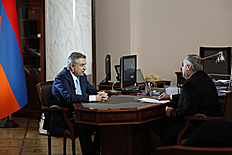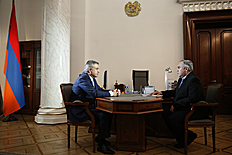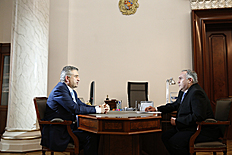Interviews and press conferences
Negotiations are promising when the parties want to listen to each other
Acting Prime Minister Karen Karapetyan’s Interview to Shant TV Company
- Mr. Karapetyan, this morning you did not go to the talks with Nikol Pashinyan, stating that you saw no prospects in attending the talks, the agenda and the format of which were dictated unilaterally. In your opinion, when will the talks be prospective?
- In our statement, we commented on it, and there is no difference between our previous interpretation and I think that the logic is obvious. Negotiations are promising when the parties want to listen to each other and want to perceive the other’s position.
Whether they will come to terms, whether they will be flexible as negotiators or not, depends on the process. But this way we cannot have negotiations; I do not even know what it is when from the very outset one of the sides announces the agenda, while the other side has no right to formulate the agenda.
- There were no negotiations, instead a press conference was held, as several dozens of media outlets had gathered, and during that press conference Nikol Pashinyan said Karen Karapetyan is not confident of his abilities as a negotiator, and also made the following remark: “If a person is not confident of his negotiating capabilities inside his country, how can he negotiate, for instance, on the Nagorno-Karabakh issue?” How would you comment on this?
- First and foremost, I do not actually know whether Mr. Pashinyan boasts great experience as a negotiator, but I have an exciting negotiation experience, which covers different fields - cultural, religious, topical and linguistic. And so far, I have not lost a single negotiation process. To be a good orator or to have a good reputation does not yet mean to be a good negotiator. That is why my answer is the same.
- During yesterday’s rally, Pashinyan declared that either he will be prime minister or the country will have no prime minister. On another occasion, he noted that if he does not become prime minister, then the crisis will go deepening. How would you comment on this, and in general, how do you see the solution to the problem, no matter who will be prime minister?
- Look, I want people to know what I am going to say. They say that the negotiations should be held around one side’s agenda; there is no agenda other than mine, I am the only prime minister, and no one else ... We talk about democracy, pluralism, listening to each other, tolerance, about the Constitution, the parliamentarian country. This is like a monopoly - monopoly in the political field.
Then, the other side says I am the candidate for premiership. In fact, I treat very well those people who have been expressing their distrust, dissatisfaction and disagreement. Thank God, everything is going on in peace, and I hope that it will be the case ahead. We need to build the political culture of listening to each other.
Now, if our citizens gathered in one place name a person as prime minister, while other people gathered elsewhere say the prime minister is another person, how can we choose the prime minister?
That is why there should be a platform where the prime minister could present his plan. I think Mr. Pashinyan has a plan, what kind of country he wants to build, what are his targets in terms of security, foreign relations, economic growth, social, justice, etc. The program is just what we must choose.
We are not going to elect a good, moral, prestigious person, we are going to accept and choose the idea, and I do not rule out that the citizens who are dissatisfied with today’s policies may want him to be prime minister, but maybe not.
Maybe, they are dissatisfied with today’s governance, but if they are given the choice of the prime minister in the face of a person, program or team, it may turn out that Mr. Pashinyan is not their nominee.
That is why we say that the Constitution regulates that all; please go to the National Assembly with your program, and if you have the necessary vote of confidence, get it and become prime minister. But no one should monopolize it by stating: I am the prime minister, there is no other candidate, I am the one to dictate the agenda of negotiations, and you do not have the right to formulate the agenda. I do not think we wanted to build a society like that.
- And lastly, especially over the past few days, there is a largely shared viewpoint that the authorities are not consolidated. Do you concur with this opinion?
- That is, the authorities are not consolidated, what does it mean? If you mean the authorities, they are working normally; if you are talking about the political parties, I think they are consolidated.
- How do you see that consolidation against those views?
- To tell the truth, I do not understand the factors they mean.
- Because that was not mentioned before this movement.
- You know, there are so many things circulated in the press - my resignation, our denial, then resignation again. If we kept responding to such allegations, we could spend all day doing so. The solution I actually see is as follows: in fact, we are facing a crisis, we have accumulated problems and we have to choose exactly which force or which coalition of political forces may lead the country to a better future.
We have to choose a program, not a person. We must choose a team, we should be able to listen to each other, and also we must be tolerant.
We do not hide that we have our share of responsibility, and maybe a great share of responsibility for this atmosphere of intolerance; there are so many accumulated social problems, but we must get out of this situation perhaps by talking to each other, admitting our mistakes, hearing the other’s opinion. Nothing ought to be monopolized, no good will come of it.


